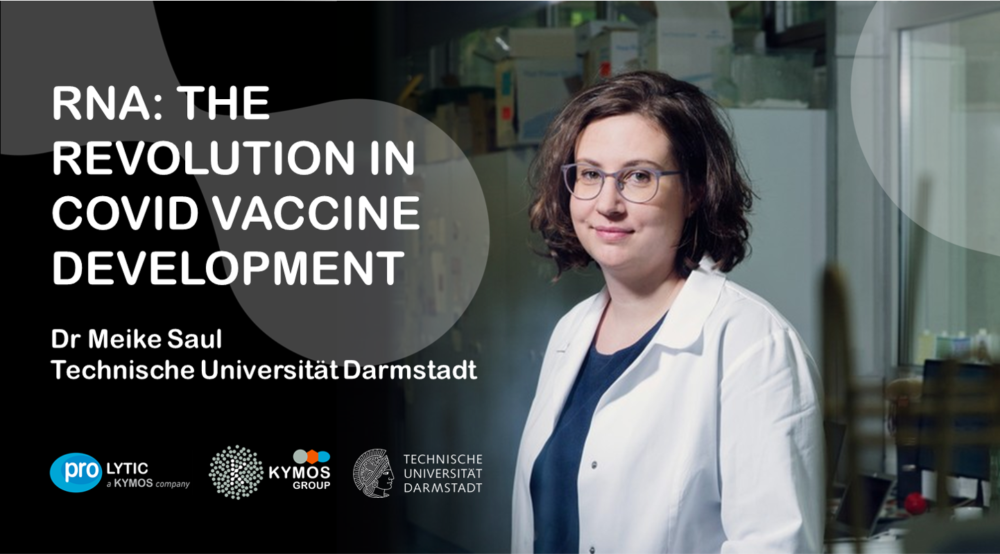
The new COVID-19 vaccine developed by Pfizer/BioNTech was approved by the EMA last December and now Moderna’s is following suit. Both are based on mRNA technology and represent a very different type of vaccine compared to traditional ones. While the general public is just beginning to discover mRNA technology, Dr. Meike Saul is an expert in RNA research and has worked with Prolytic GmbH for many years. She was invited to give us a better insight into the exciting world of RNA.
Dr. Saul is a research group leader at the Technical University of Darmstadt and specializes in microRNAs (miRNA), which are small molecules that play an important role in different diseases such as cancer. “RNAs, and miRNAs in particular, are especially important in personalized medicine,” begins Dr. Saul. “As biomarkers, miRNAs can be used to determine disease, progression or for stratification. RNA also serve as targets for the development of RNA therapeutics and RNA vaccines. For example, until the early 2020s, RNA-based vaccine technology was seen as having great potential but lacked final market readiness. With COVID-19, that has changed. In particular, the development of messenger RNA (mRNA)-based vaccines against COVID-19 by Pfizer/BioNTech and Moderna has put this technology in the spotlight” she concludes.
According to Dr. Saul, the newly registered mRNA-based vaccines have demonstrated the advantages of RNA technology, starting with much faster development:
“It’s no coincidence that mRNA vaccines were the first to be available. With regular vaccines, you take attenuated viruses or purified viral proteins to train the immune system to recognize the virus. The development is cost-intensive, time-consuming, and can be accompanied by severe side effects. But mRNA vaccines are different: the subject is injected with mRNA that encodes a viral protein fragment allowing the cells to translate and generate the viral protein fragment directly in the body, guiding the immune system to neutralize the real virus.
Some benefits of mRNA vaccines vs conventional:
- After some time, the body degrades the mRNA, providing fewer side effects vs conventional vaccines.
- The production of mRNA-vaccines is comparatively cheaper and can be scaled up easily.
- Viruses tend to change and mutate to survive, yet mRNA-vaccines are able to address these mutations better than conventional vaccines.
Seeing the threat of new COVID strains appearing, the adaptability of mRNA vaccines is a real revolution in the fight against the pandemic.”
Dr. Meike Saul reflects upon the positive effect these new developments are having on her RNA work at TU Darmstadt and her cooperation with Kymos subsidiary Prolytic:
“My research aims to identify novel miRNA functionalities and their role in intercellular communication in cancer and autoimmune diseases. The goal of this research is to transfer these findings into clinical application to improve treatment strategies, through new RNA-Therapeutics and miRNA-based biomarkers. This is why we started our cooperation with Prolytic.”
She states: “The need for valid RNA analytics is higher than ever now that mRNA-based vaccines have gained significantly more acceptance in the pharmaceutical industry among investors and governments. For this reason we have joined forces with the GLP bioanalytics experts at Prolytic, to launch two federally-funded RNA research projects: The first, completed in 2019, focused on the development and validation of an analytical method for quantifying miRNAs in plasma according to GLP guidelines. The second is a currently ongoing project that aims to develop a lung cancer diagnostic kit using miR-574-5p as a tumor and stratification marker in a validation study of ~150 lung cancer patients. This collaboration with Prolytic has secured funding of approximately €1.7 million and aims to provide the opportunity to improve anticancer treatment. “Just like with mRNA-based vaccines, miRNA-biomarkers can increase the efficiency of cancer therapies in unprecedented ways.”
At this point, Dr. Meike Saul emphasizes how important the collaboration with Prolytic is:
“In general, the analysis of mRNAs and even miRNAs is not that difficult, however establishing robust methods for valuable results is more tricky. The team at Prolytic have been a key collaboration partner. With their 30 years of experience in bioanalytics and broad know-how in different techniques, study types, and substance groups, we were able to quickly develop a reproducible and reliable analysis method for miRs.”
Prolytic was able to extend its expertise to siRNA, mRNA and DNA, in addition to its research collaborations with Dr. Saul. A new device based on high- and medium-throughput magnetic beads allows Prolytic to automatically isolate and purify nucleic acids, proteins, and cells. This significantly speeds up the analysis of oligonucleotides. To date, Prolytic has supported its customers in their research projects for oligonucleotides used as biomarkers, vaccines, or therapeutic RNAs and now as part of the Kymos group not only will Prolytic expand its offer with additional know-how in vaccine potency assays, but also aim for GMP certification to offer CMC services for advanced therapy medicinal products. Supporting customers up to batch release and manufacturing is the goal for the future.
The Pfizer/BioNTech and Moderna vaccines will no doubt be followed by many more applications of RNA technology. The teams at Kymos and their German subsidiary Prolytic have the chance to guide the implementation of these technologies in a clinical setting while being a part of the continuing RNA revolution.
PROYTIC GmbH is an expert in GLP-certified, GCP-compliant bioanalysis and PK for the analysis and quantification of small and large molecules, enzymes and oligonucleotides. Here you can learn more about PROLYTIC’s Bioanalytical Services and DNA/RNA advanced work or contact us on info@prolytic.de.

